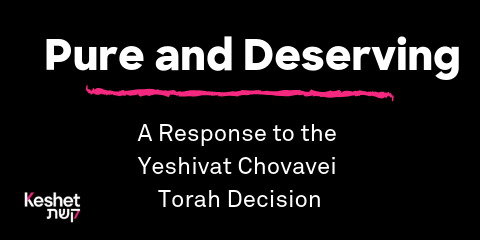This has been a trying week for many in our community, particularly those within the Orthodox community or who are formerly a part of the Orthodox Community. This week we learned that the Rabbinical Seminary Yeshivat Chovavei Torah had effected a policy change, prohibiting the ordination of queer students at their Rabbinical Seminary.
In the Talmud, in Tractate Sanhedrin, we learn the requirements for a Rabbi to sit on the highest Rabbinic Court, the Sanhedrin. One Rabbi, Rabbi Yochanan, suggests a number of requirements for Rabbis. They must be tall, wise, good looking, and old. They also must have mastered sorcery and all 70 languages. In short, these requirements are specifically designed to exclude all but a select class of men. It sets the Jewish “ideal” as a nigh unattainable goal.
Rav Yehudah, in the name of Rav, presents an alternative approach. Rav argues that one is only placed upon the Sanhedrin if they are able to “make pure a sheretz by Torah Law.” A Sheretz is a creepy crawly thing deemed by the Torah to be irreparable impure. These Shratzim convery impurity from any interaction with them and are inherently and irrevocably impure.
As LGBTQ folks, this feels discomfitingly familiar. This week, just as in every week of the year, there are those in the Jewish community who are told that they are Shratzim — impure and undeserving of access to Torah. It takes, as Torah scholar and past Keshet Teen Shabbaton staff member Laynie Soloman argues, Rabbis of the highest order to make the case that the Torah itself can make pure those who are told that they are Shratzim. At this moment in the history of Judaism, we need such Rabbis, and we stand in solidarity with them whether or not they have received formal ordination.
We must displace our definition of Rabbi from Rabbi Yochanan with Rav’s view: the purpose of a Rabbis is to expand Torah and Judaism rather than to restrict it. As our fellow queer Jews are faced with these challenges, we at Keshet stand in solidarity with all those who are told they are not pure enough.
As a Keshet Board member, I want to say to all those who feel hurt by this decision: we at Keshet see your pain and recommit ourselves to the work of helping you and empowering you to make every Jewish space more inclusive and affirming. We will work to help others create spaces where all LGBTQ Jews can access Torah and Jewish leadership. Ken Yehi Ratzon. May it be so.
Shavua Tov.



